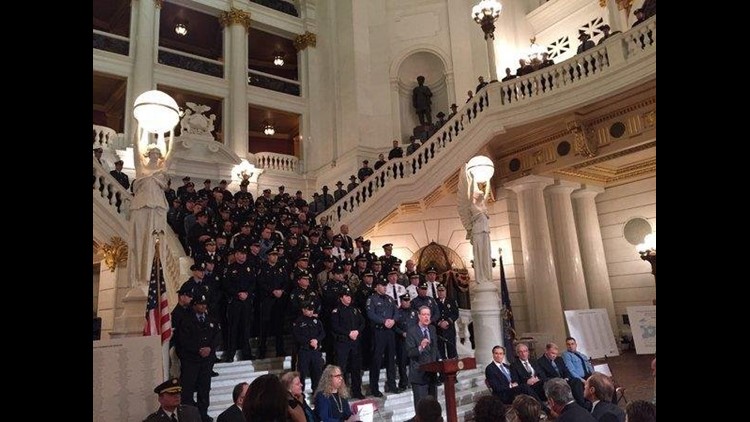HARRISBURG, Pa. —The Wolf administration today recognized more than 300 municipal police departments, the Pennsylvania State Police (PSP) and hundreds of individual police officers who have reversed more than 600 opioid overdoses in a little more than one year.
With more than 150 uniformed police officers lining the stairs of the Capitol Rotunda, Lt. Gov. Mike Stack, along with Department of Drug and Alcohol Programs Secretary Gary Tennis, Physician General Dr. Rachel Levine, Pennsylvania lawmakers, and representatives from the Pennsylvania Commission on Crime and Delinquency (PCCD), Pennsylvania District Attorneys Association (PDAA), Pennsylvania Chiefs of Police Association (PCPA), PSP, and the insurance industry – all key partners in equipping police with naloxone – thanked and praised police for their life-saving work.
“The magnitude of the addiction and overdose death epidemic in this state is astounding — at least seven Pennsylvanians die every day from a drug overdose,” said Lt. Gov. Stack. “But when I look at the organizations and individuals who have come together and stand among us today, I am hopeful. The collaboration and commitment we have seen from this group has saved hundreds of lives. Under the leadership of Gov. Wolf, who has made addressing the overdose death epidemic a top priority of his administration, Pennsylvania is setting an example for the rest of the nation.
“Our police officers risk their lives daily so that others may be protected,” Lt. Gov. Stack said. “Those departments and officers who have answered the call to carry naloxone have demonstrated their extraordinary commitment to their communities and willingness to go the extra mile to protect and serve. You are to be commended.”
Act 139, or “David’s Law,” made naloxone available to law enforcement, first responders, and anyone else who may be in a position to assist an individual at risk of experiencing an opioid-related overdose. It also provides immunity from prosecution to individuals who seek help when someone overdoses as well as to anyone administering the medication. Named for David John Massi II of Upper Chichester who, at age 27, died of an overdose, the law took effect in November 2014. Since then, DDAP has led a coordinated effort to equip municipal police departments with naloxone.
Along with Physician General Levine, who signed a standing order giving law enforcement officers and firefighters the ability to access naloxone, DDAP raised more than $600,000 from health insurers across Pennsylvania to provide naloxone to police at no cost. Grant money provided through the Pennsylvania Commission on Crime and Delinquency also was used to purchase naloxone. The PDAA and PCPA managed the money and worked with municipal police departments and county district attorneys to pay for the medication.
With nearly 2,500 overdose deaths in Pennsylvania in 2014 and estimates that the 2015 total will be higher, police are instrumental in saving the lives of anyone who overdoses on prescription pain medication or heroin. According to a Center for Rural Pennsylvania survey of police departments, police are first on the scene of an overdose approximately 70 percent of the time.
“I stand here today humbled to be with so many heroes,” Secretary Tennis said. “The municipal police departments and individual officers here today, and those across the Commonwealth who have chosen to equip themselves with naloxone, truly are heroes to not only the hundreds of Pennsylvanians whose lives they have saved, but to the thousands more family members and friends who have been spared a devastating loss from the disease of addiction. Thank you for honoring your commitment to protect and serve. Without your efforts, we know that the death toll from the disease of addiction would be significantly higher.
“I am also honored to be part of such a collaborative effort among so many organizations and individuals committed to doing what is right in fighting the worst overdose death and addiction epidemic we have ever seen. From the legislators who had the vision and determination to write and pass Act 139, to the strong support of Gov. Wolf to implement the law, to the insurance companies who donated hundreds of thousands of dollars to equip police departments with naloxone at no cost, to the district attorneys who helped orchestrate the effort, to Department of Drug and Alcohol Programs staff who continue to work tirelessly to track our efforts and support police departments in equipping their forces with naloxone, I say thank you.”
Naloxone is a medication that can temporarily reverse an overdose that is caused by an opioid drug (prescription pain medication or heroin). When given during an overdose, naloxone blocks the effects of opioids on the brain and restores breathing within two to eight minutes. Naloxone has been used safely by medical professionals for more than 40 years and has only one function: to reverse the effects of opioids on the brain and respiratory system in order to prevent death.
“Naloxone has no potential for abuse,” Physician General Dr. Levine said. “A person can’t get high or become addicted to it, and it is safe to use. It’s important to remember that although police and other first responders now have access to naloxone, family members and friends can also access this medication by obtaining a prescription from their family doctor or by using my standing order, which is a prescription written for the general public, rather than specifically for an individual. Often times, it’s a family member or friend who is first to find the overdose victim, and minutes can be the difference between life and death. I encourage anyone who is suffering with an opioid addiction or is regularly taking prescription opioids for pain, as well as their families, to have naloxone in their homes.”
The Wolf Administration will continue to work with district attorneys and police forces to educate them on combatting the heroin epidemic, raise awareness of the resources available to them, and dispel the misperceptions about naloxone and broader social stigmas surrounding drug use. DDAP hopes that these efforts will encourage a greater number of police forces to carry naloxone.



